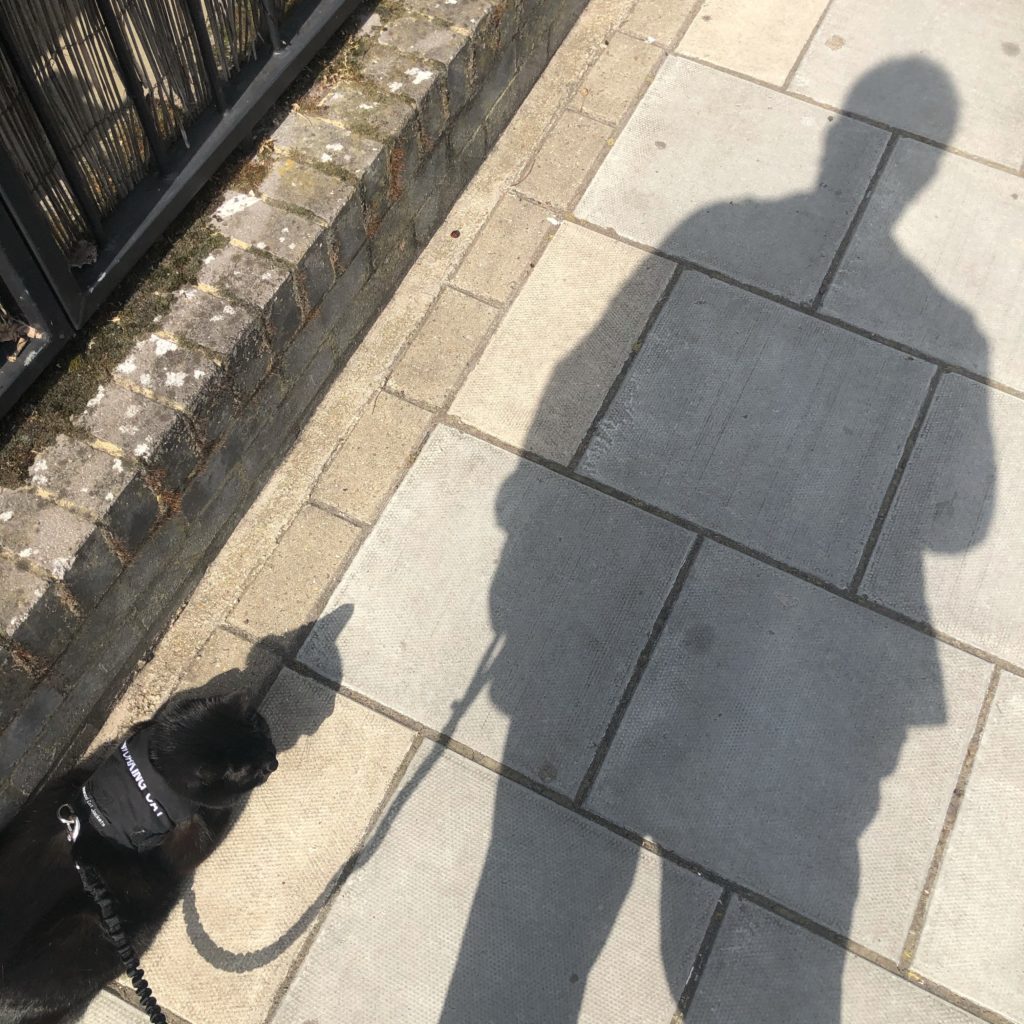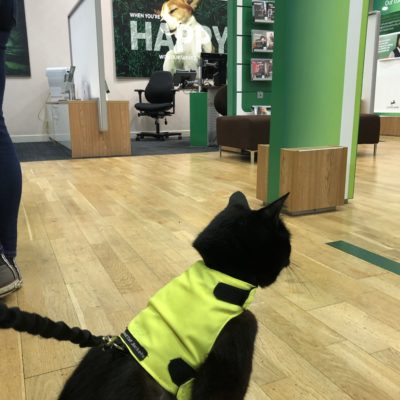Dogs aren’t the only assistance animal
In the UK, there is purposefully no legal definition of an assistance animal. In fact, the rights of assistance animal owners are accommodated by Section 20 of the Equality Act 2010. This states that service providers have a duty to make reasonable adjustments to avoid putting people with disabilities at a substantial disadvantage compared to people who are not disabled.
While rare, assistance cats do exist and their owners have the same rights as owners of assistance dogs. Like assistance dogs, assistance cats carry out a variety of practical tasks for people as well as supporting their independence and confidence.
The following guidance is based on ‘Assistance dogs: A guide for all businesses’, published by the Equality and Human Rights Commission.
Assistance cats are not pets – they are ‘auxiliary aids’
Assistance cats are highly trained which means they:
- will not wander freely around the premises
- will sit or lie quietly next to their owner (but most likely on a chair, not the floor)
- are unlikely to foul in a public place
Some will be wearing a harness or jacket. However, the law does not require the cat to wear a harness or jacket to identify it as an assistance animal. Assistance cats will be owner-trained and are their owner is unlikely to carry an ID book. As with assistance dogs, an ID book is not a legal requirement and assistance cat users should not be refused a service simply because they do not possess an ID book.

Assistance cats are not ’emotional support animals’
While assistance animals can also provide emotional and psychological wellbeing and improve the confidence of disabled people who use them, they are typically trained to a higher standard than those that provide purely emotional support.
But even if they were, the same rules would apply
If a person meets the Equality Act’s 2010’s definition of disability and has an emotional support animal to help them manage that disability, then the act requires service providers to make reasonable adjustments. For example, providing access to the animal.
Why should assistance cats be welcomed by businesses?
Disabled people who use assistance animals quite often experience discrimination that prevents them from doing everyday things other people take for granted. This is because shops, restaurants and other businesses sometimes object to assistance animals being brought onto their premises. If this happens, the effect is to deny the disabled person the opportunity to buy goods or use services in the way other people do.
Potential consequences include losing valuable business and risking claims of disability discrimination, which could result in financial compensation.

What are my legal obligations?
A disability is defined by the Equality Act 2010 as ‘a physical or mental impairment which has a substantial and long-term adverse effect on the ability to carry out normal day-to-day activities’.
It is unlawful for a service provider to discriminate against a disabled person in the following ways:
- Direct discrimination: treating a person less favourably than others because they are disabled or perceived to be disabled. For example, refusing to allow entry to disabled customers, whether or not they have assistance animals.
- Indirect discrimination: where a particular policy has a worse impact on disabled people than on people who are not disabled. For example, a ‘no animals’ policy will have a worse impact on disabled people using assistance animals and could be indirect discrimination unless the policy can be objectively justified.
- Discrimination arising from disability: treating someone unfavourably because of something connected to their disability. For example, refusing the same level of service to a disabled person because they have an assistance animal.
- Failure to make reasonable adjustments: where a physical feature, provision or practice puts a disabled person at a substantial disadvantage the service provider has a duty to take reasonable steps to avoid that disadvantage. For example, it will often be reasonable to disapply a ‘no animals’ policy for assistance animal owners and a failure to do so would amount to unlawful discrimination.
- Disability harassment: treating someone in a way which makes them feel humiliated, offended or degraded for reasons related to their disability.
- Direct discrimination by association: treating a person who may or may not be disabled less favourably because of their association with a disabled person.
- Victimisation: treating a person who may or may not be disabled badly because they have made a complaint of discrimination or supported someone who has made a complaint.
- Discriminatory advertisements: if a service provider advertises that in providing a service they will treat disabled people unfavourably this will amount to discrimination. For example, stating in a brochure that assistance animals are not welcome on the premises.
- Positive discrimination: the law recognises the particular disadvantages that disabled people face and so treating disabled people more favourably than others is permitted.
It would be unlawful to refuse a service to a disabled person accompanied by an assistance animal except in the most exceptional circumstances. Ultimately only a court can determine whether a refusal of service is unlawful and such a determination would be highly dependent on the specific facts and circumstances of the particular case.
What do I need to do as a business owner?
How can I tell it is an assistance cat and not just a pet?
Assistance animals are highly trained to the owner’s requirements and:
- will not wander freely around the premises
- will sit or lie quietly next to its owner
If you have a lot of customer-facing staff, consider displaying a small sign or sticker on the door or wall at the entrances showing that assistance animals are welcome. Make sure all relevant staff are made aware that they must allow access to assistance animals.
What if the animal fouls on my premises?
Assistance animals are highly trained and so are very unlikely to foul in a public place.
My business sells food products, am I obliged to allow assistance animals in?
Assistance animals are highly trained, have regular veterinary treatments and are tested on a regular basis to make sure they don’t present a health risk. The Chartered Institute of Environmental Health has determined that they are unlikely to present a risk to hygiene and should be allowed access to restaurants, cafes, hotels, food shops and other food premises.
What if the assistance animal is a danger or nuisance to other customers or staff?
Assistance animals are highly trained to make sure they are always under control and will not be a nuisance to anyone. For example, they will not jump up and will lie down if the owner sits down to eat.
Why should I allow a disabled person to be accompanied by their assistance animal?
Disabled people rely on their assistance animals to assist them with everyday tasks and would find it hard to manage without them. It would be unlawful to refuse access to a disabled person accompanied by an assistance animal except in the most exceptional circumstances (for example, in certain hospital wards).
Assistance animals as well as being trained to carry out tasks can also provide emotional and psychological wellbeing and improve the confidence of disabled people who use them.
Are there cultural or religious reasons to deny service to a person with an assistance animal?
Religious or cultural beliefs have sometimes been cited as a reason for the non-admittance of assistance animals. However, service providers should permit access to assistance animals and such beliefs are not a defence against non-compliance. However, this is a sensitive aspect of the access issue and tact should be used by all involved.
What if someone is or might be allergic to dogs or cats?
Refusing to allow access to people with assistance animals because other people ‘might’ be allergic to dogs or cats is likely to be unlawful disability discrimination. This is because the Equality Act 2010 states that service providers must make reasonable adjustments to policies for disabled people. This includes amending ‘no pets’ policies to allow access for assistance animals.
If there is an identifiable person with an allergy to dogs or cats then employers and service providers should take reasonable steps to ensure that person has minimal or no contact with dogs or cats; reasonable steps are unlikely to include banning all assistance animals.
Contact
Equality Advisory and Support Service
For advice, information, or guidance on equality, discrimination, or human rights issues, please contact the Equality Advisory and Support Service, a free and independent service.
References
- Assistance dogs: a guide for all businesses (Equality & Human Rights Commission)
- Assistance Animals: Question for Women and Equalities (UK Parliament)
- Discrimination in the provision of goods and services – duty to make reasonable adjustments (Citizens Advice)
Further reading
- Equality Act 2010 guidance and information (Equality & Human Rights Commission)
- Equality Act 2010 (legislation.gov.uk)
- Take the lead: a guide to welcoming customers with assistance dogs (Equality & Human Rights Commission)
- Stable genius: Britain’s first guide horse for blind people (The Guardian)
- UK’s first guide horse prepares for London job by taking the Metro (Sky News)
- Meet Digby – born and bred in Yorkshire, he’s the UK’s first guide horse in training (The Yorkshire Post)
